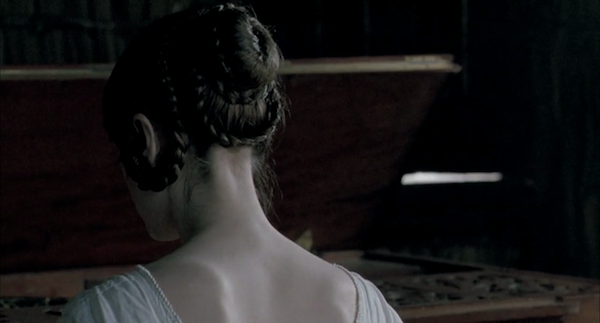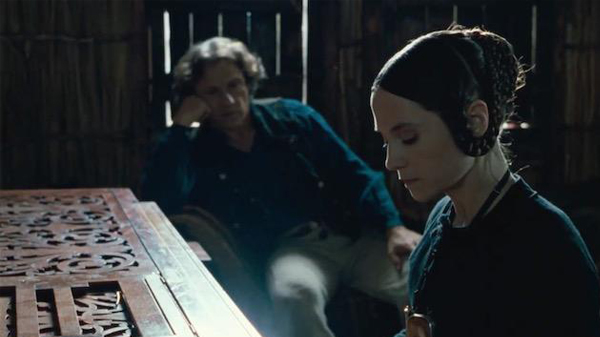Do you remember the first film that showed a woman’s world through her own eyes? To this day, Jane Campion’s The Piano is still the only film directed by a woman to win the Palme d’Or – but for Laura Venning it represents even more. The distant New Zealand shores offered one writer a gateway into feminist cinema that would change everything.
I remember the first time I saw The Piano vividly. Spring 2010; I was 16. It was one of those free DVDs that newspapers used to give away in flimsy card sleeves. Most of them were probably destined for the bin or the charity shop, but every now and then they held the potential to open up new worlds. I was just getting interested in film and began to methodically plough through the classics: David Lean, Godard, Kurosawa, etc. Neither of my parents really knew what The Piano was about. “It was a big deal at the time,” Mum said vaguely. “It’s a period drama. Nice music.” She wasn’t wrong, but what unfolds is oceans away from the polite restraint of a Jane Austen adaptation. Last week, film critic and Artistic Director of the Indie Memphis Film Festival Miriam Bale asked Twitter to name movie moments which had helped prompt their feminist awakenings. Many people mentioned films with overtly sexist scenes and/or one dimensional female characters, but others highlighted work by female directors that had alerted them to what they’d been missing all this time. The Piano was that film for me.
When I was 16, I didn’t know how to respond to a heroine as unknowable as Ada McGrath (Holly Hunter, in an Oscar-winning performance). Mute from the age of six, she’s being shipped across the globe like cargo to marry Stewart (Sam Neill), a landowner in colonial New Zealand who she has never met, accompanied by her young daughter Flora (Anna Paquin) and her beloved piano. Trussed up in their bonnets and voluminous Victorian dresses, Ada and Flora couldn’t look more out of place on a desolate beach battered by crashing waves. Stewart refuses to bring her piano through the tangled woods; he can’t understand why Ada doesn’t want her clothes or her kitchenware. Forester George Baines (Harvey Keitel) takes possession of the piano and strikes a deal with Ada: she can earn it back if he can touch her while she plays – and their arrangement escalates into an affair with shattering consequences. Inspired by Emily Brontë’s Wuthering Heights, Jane Campion’s vision is dark, stormy and unsettling in its eroticism. It’s also undeniably a woman’s vision.
The beautiful, enigmatic woman is so often fetishised in films directed by men. She is usually either the unattainable femme fatale or ethereal ingenue, and rarely do women get to be unknowable only for themselves. At first, I couldn’t understand Ada’s choice not to speak. Why would a Victorian woman bought and sold like property oppress herself further by denying herself a voice? Her romance with Baines is even more inexplicable. He takes her piano and coerces her into letting him touch her so she can “earn” back what is rightfully hers. Not many teenagers I knew were discussing feminism in 2010, but I knew that this wasn’t what empowerment should look like. And yet Ada does have a voice. As she tells the audience in her “mind’s voice” at the very beginning of the film: “The strange thing is, I don't think myself silent. That is because of my piano.” By refusing to speak, Ada refuses to play the role of the meek wife spouting bland niceties that patriarchal society would confine her to. To stay silent is her rebellion, and to speak via creative expression is truly transgressive for a woman. Michael Nyman’s haunting score acts as a bridge between Anna’s inner and outer worlds. His unmistakable theme swells as Ada gazes down from the cliff at her piano abandoned on the beach, and I felt her grief at the separation which is Stewart’s attempt to truly silence her.
Although Baines’ exploitation of Ada for his own sexual satisfaction made me deeply uncomfortable, I also couldn’t deny the power of seeing Ada’s sexuality slowly uncovered and set free from layers upon layers of costume. At the time, I was unnerved by Campion’s ability to capture erotic intimacy in scenes that I knew should be repulsive, especially the moment when Baines gently touches Ada’s leg with his fingertip through a tiny hole in her stocking. This one brief close up outshines any of the sex scenes for pure sensuality. Campion understands that sometimes the lightest touches have the most impact. Ada articulates my own confusion perfectly, when she hits Baines’ chest with tearful frustration after he tells her to leave because he knows she doesn’t love him. Her repression dissipates, she embraces him and they undress. It was the first time I’d ever seen a woman receiving oral sex on screen.
“Her playing is strange,” says one of the other colonial women of Ada, “like a mood that passes into you.” She could also be describing the experience of seeing The Piano for the first time. Rewatching it four years later in the middle of a film degree that wasn’t very interested in films directed by women, I was entranced in a different way. I found myself indescribably moved, crying in places where it didn’t make sense to. I saw a celebration of unrestrained female desire, pleasure and determination, coupled with female creativity as a transcendent force. I realised what combing through the established, supposedly untouchable canon of great films had deprived me of. Seeing The Piano inspired me to seek out the work of female film directors who seemed sidelined by film history: Agnès Varda, Kelly Reichardt, Lynne Ramsay, Julie Dash, Ida Lupino, Věra Chytilová, Sally Potter, Claire Denis and Lucretia Martel, as well as new talent like Desiree Akhavan, Josephine Decker and Chloé Zhao. The Piano will be forever enshrined as the first (and still only) film directed by a woman to win the Palme d’Or, and, like the needlework the colonial women busy themselves with, it will continue to be picked at, embroidered and unravelled for years to come. Just as Ada is uprooted, so the work of Jane Campion and many other female filmmakers has transported me on voyages to wild and distant shores.
Our JANE CAMPION t-shirt is available to purchase here. Proceeds go towards paying our writers and supporting female-led film projects.
Laura Venning (@laura_venning) is a Film Studies MA student and writer based in London and Norwich. She's particularly interested in female filmmakers and in Australian and New Zealand cinema and has written for Reel Honey, Much Ado About Cinema and Screen Queens.
READ ME is a platform for female-led writing on film commissioned by Girls on Tops. Louisa Maycock (@louisamaycock) is Commissioning Editor and Ella Kemp (@ella_kemp) is Contributing Editor.



